So, you’re planning an RV trip to Homosassa, Florida, huh? We hope you’ll stay with us at Cedar Breeze RV Park. Our resort has everything you need for an amazing stay—full hookups, WiFi, nightly and long-term rates, with close proximity to shopping and the area’s finest natural parks.
Here are our top tips for maintaining your RV or travel trailer for your journey to the Gulf Coast.
Regularly check and maintain the RV’s roof seals and seams.
Want to have a stress-free vacation? One of the most important things to keep in mind is the condition of your RV’s roof seals and seams. Florida has some of the highest rainfall in the country, especially during summer when many people are vacationing here. The last thing you need during your stay is a roof or window leak!
To avoid this common problem, start with a thorough vehicle check before you leave home. Inspect the roof for any signs of wear and tear, such as cracks or gaps.
If you notice any issues, apply a sealant like EternaBond Tape or Geocel ProFlexRV Flexible Sealant. You’ll want to pack a few of these emergency supplies for your trip and check the roof 1-2 times a month.
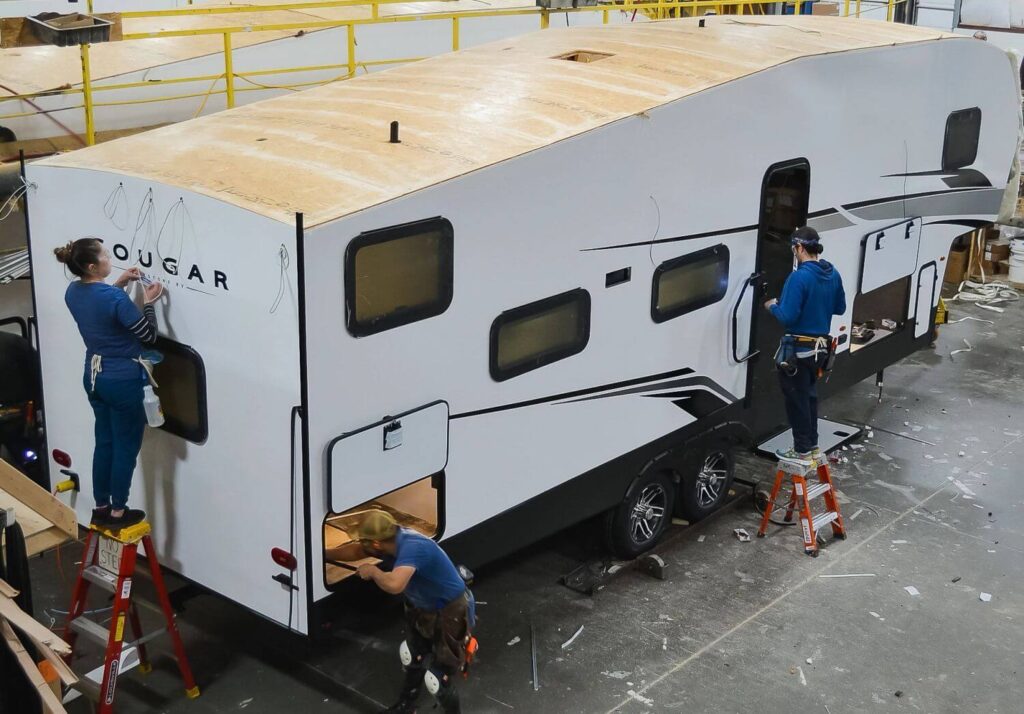
Keep the RV’s air conditioning system in good working condition.
Florida may be paradise, but it’s also one of the hottest, most humid places in the country. It’s nearly impossible to imagine how natives and early European settlers were able to stand the conditions prior to the indispensable advent of the air conditioning unit in 1902. Ergo, maintaining your RV’s A/C should be of top priority during your travels.
- Make sure the plastic enclosure (also known as the shroud) is free of cracks that could allow water to enter.
- Remove the shroud and check the foam rubber gasket between the A/C and the roof. Ensure that moisture has not soaked the gasket and isn’t leaking into the square roof hole.
- While the cover is off, ensure the cooling fins are straight and clean. If they’re bent, straighten them out with a fin comb. Clean the coils if they’re dirty with coil cleaner.
- From inside the RV, remove the ceiling enclosure and inspect this area for water as well.
- Clean the air filter at least once a month in warm, soapy water.
- Some campers also prefer to keep a portable dehumidifier around for the muggiest of days.
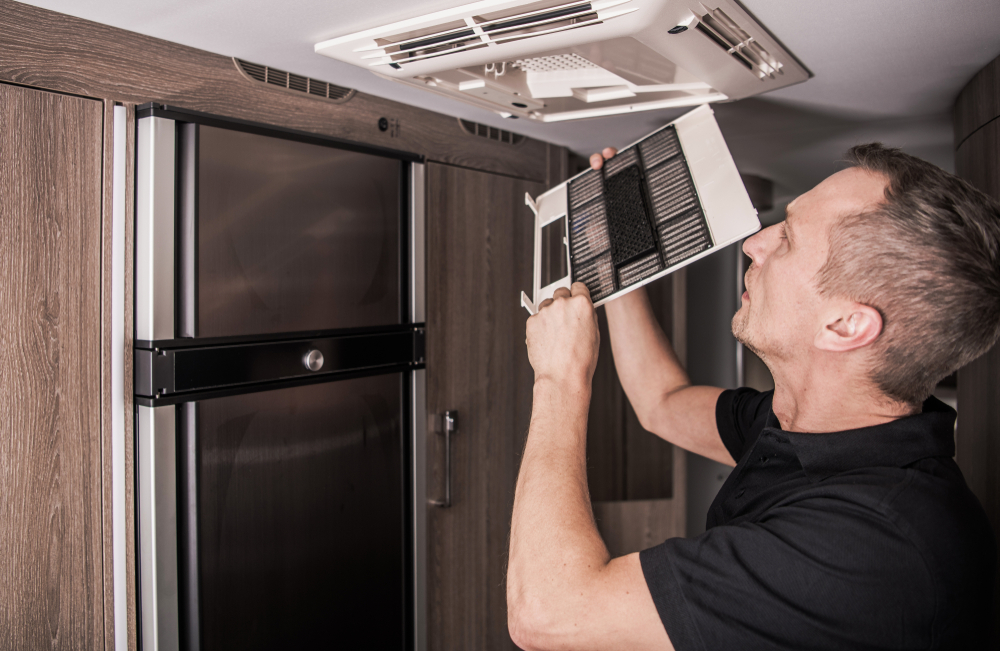
Clean the RV exterior regularly.
If you live in a dry climate, you probably don’t need to clean your RV’s exterior too frequently in order to keep the mold and mildew away. Life in humid Florida is another story for full-time and long-term RVers. You should expect to scrub down your RV at least once a month to maintain the health of the exterior aluminum or fiberglass walls.
Pack the following RV cleaning supplies before you set sail on the open highway.
- A gallon of all-purpose RV wash, such as Meguiar’s M5401 Marine/RV Gel Wash.
- RV wax. Travelers may prefer to have a wax done before setting off for their destination, or simply keep a few bottles of dual wash and wax on hand for the journey.
- Soft bristle auto brush with extension pole
- Buckets
- Drying towels
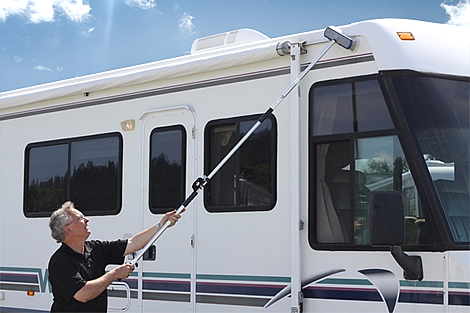
Roll your awning up every afternoon during peak summer months.
Why would that be necessary, you may be asking? Florida storms, which usually occur in the afternoon, are notorious in June, July, and August for their fast onset, heavy rains, high wind, and the occasional inclusion of hail. Don’t risk your RV awning, which probably cost you a significant amount of money!
What’s more, if your awning were to “take flight” on the wings of a brawny bluster and make contact with a nearby camper, you may be liable for damage. We think that’s a good reason to ask yourself these questions while vacationing in Homosassa: Is my awning open or closed? Do I need to close it before I leave for a day’s adventure?
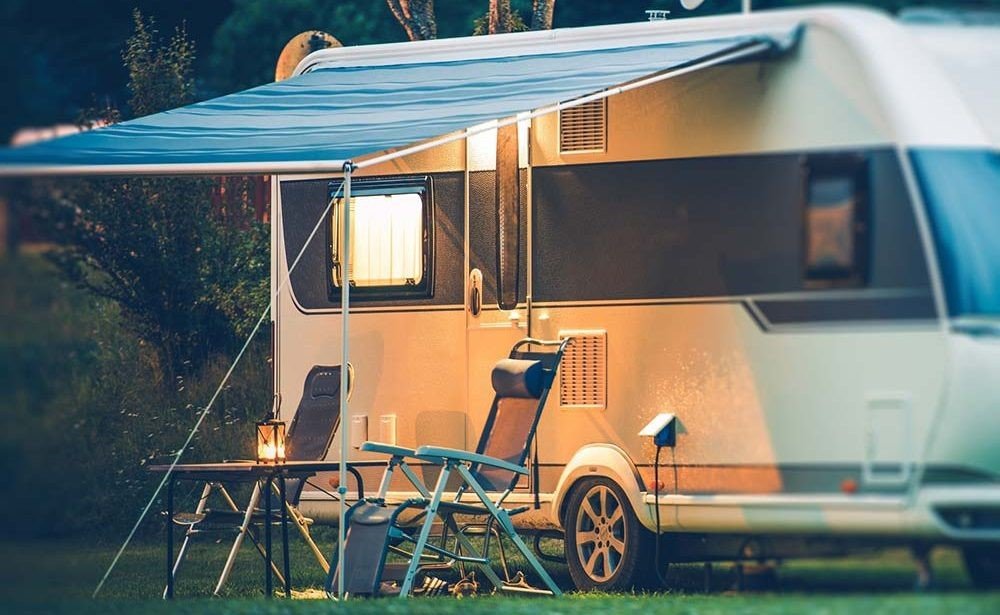
Maintain your electrical system.
Maintaining an RV electrical system is crucial to ensure that all appliances and devices work properly while on the road.
- Maintain your battery: Hook up to shore power when you arrive at your RV resort. This will charge the battery. Next, open the battery enclosure and check the battery terminals for corrosion. Do this at least once every couple of weeks during your stay in Florida.
- Check the connections: After any significant journey, inspect the electrical connections and wiring for any signs of wear or damage that may have resulted during your travels, or even a storm. Any damaged wiring should be replaced immediately.
- Save power: Turn off all electrical appliances and devices when not in use to conserve battery power and prevent overloading the system.
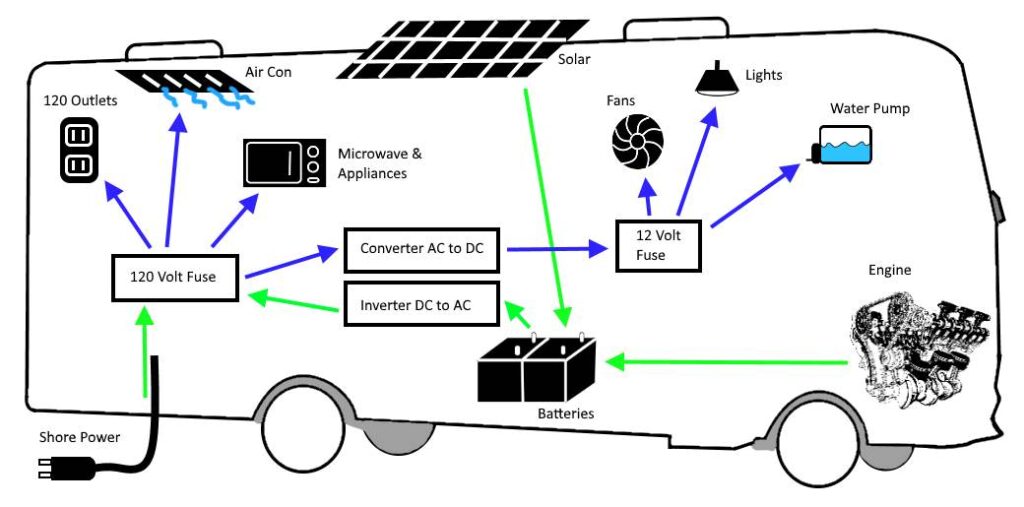
Keep an eye on your propane system.
A single gallon of propane will run for about 3 hours of continuous use. Apart from making sure you have enough propane to fuel your daily tasks, such as cooking, heating the water tanks, and running some heaters in the winter, here are some tips for maintaining your propane system.
- Always check for leaks before using the system after a long period of inactivity. You can do this by using a propane leak detector or a solution of soap and water.
- To prevent theft or damage during travel, ensure that the propane tanks are secured and locked to the cylinder bracket.
- Close the valves when not in use: This might sound basic, but you’d be surprised how many people forget this simple rule.
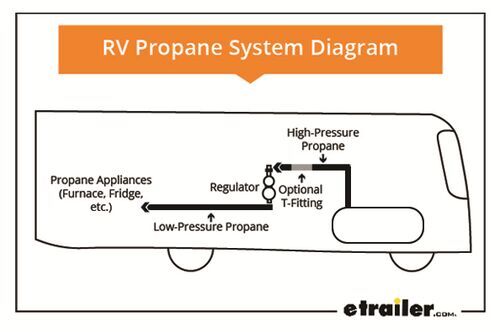
Torque the wheel lugs.
Your RV’s manual should include instructions on how to check the wheel lugs. You’ll need a torque wrench to tighten the wheel lugs every 100 miles, as they may come loose during travel. If your route follows especially hilly roads that require excessive braking, check the wheel lugs more frequently.
Proper RV maintenance is crucial for a comfortable and stress-free stay anytime you travel in your beloved road-ready rig. By following these tips, you can ensure your vehicle stays in top condition for your next adventure.








